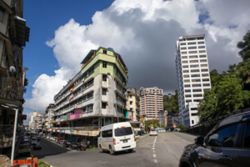
The government has to build forward-looking macro-economic narratives to convince Malaysians, domestic and foreign investors that Malaysia will rebuild for a better nation – sustainable, competitive and resilient.
MALAYSIA is at a crossroads.
The Malaysian economy has been plagued with structural challenges and weaknesses over the years, resulting in the country lagging behind its counterparts in many aspects while the newly emerging countries like Vietnam and Indonesia are fast catching up as Malaysia seems to be somewhat stagnating and the pace of change and advancement is moving slowly.
While Malaysia has seen steady improvement in the ease of doing business, it is far from satisfactory and can do much better to enhance its business and investment climate.
Our economic growth rate has been moderating (2011-2020: 4% per annum (p.a.); 2001-2020: 4.6% p.a.). National productivity growth has been weak (1.4% p.a. in 2011-2021) versus Singapore (2.5%), Thailand (2.5%), Vietnam (5%) and the Philippines (3.5%).
Private investment growth was uneven. After a sharp decline of 11.9% in 2020 during the Covid-19 pandemic, private investment has recovered to increase by 2.7% in 2021 and 7.2% to RM231.8bil (15.3% of gross domestic product or GDP) in 2022 (4.8% p.a. in 2016-2019).
The long-term average growth of private investment was 11.3% p.a. in 2011-2019; and an average GDP share of 17.1% pa.
Malaysia’s competitiveness, economic complexity and innovation ranking has been lagging behind.
In the IMD World Competitiveness ranking, it dropped to 32nd in 2022 (2010: 10th); Global Innovation ranking continued slipping to 36th in 2022 (2010: 28th).
For the Economic Complexity Index, which is a ranking of countries based on the diversity and complexity of their export basket, Malaysia ranked 24th in 2020.
Malaysia’s share of the world’s exports reduced to 0.95% in 2020 (26th rank) from 1.46% in 2000 (19th rank).
The challenges and issues hindering Malaysia include the complexity of business regulations and investment climate; a lack of private investment dynamism; slower productivity and capital efficiency; low level of technology adoption, lack of innovation and technological advancement; shortage of skilled manpower; high dependency on low-skilled foreign workers; income inequality and regional growth disparity.
The world economy is facing a multitude of geoeconomic fragmentation, technology war, environmental and climate as well as domestic economic and social problems, which are challenging Malaysia’s present and future growth trajectory.
Can the country rise to these challenges and restore its economic vibrancy? Radical changes are needed for transformations to be a competitive nation and to deliver a just, equitable, sustainable and resilient future.
This requires fundamental cognitive, behavioural and mindset shifts, including rethinking the role of state, rethinking growth dimension, rethinking resources efficiency, rethinking the commons and rethinking as well as upholding justice and ensuring equitable.
The initiatives and strategies for addressing the problems must be formulated in a coherent way, providing a mapping of a broad selection of macroeconomic policies and constructive policy proposals on the “no finishing line” transformations agenda and must be elaborated in more details.
Political rhetoric, including populist rhetoric during the course of election campaign, must not be deviating from the realism.
The government needs to carefully weigh on the fiscal budget deficit and ballooning debt sustainability when considering the populist measures, as fiscally unsustainable measures can undermine investor confidence on the soundness of managing the country’s public finance.
An important precondition is that the growth, economic and social transformations must offer strong narratives with considerable persuasive power to get buy-ins from all although we acknowledge that there will be resistance to economic reforms.
Strong political leadership, great narratives and discourses – all play a decisive role in ensuring public policies can impact the economy and businesses in a wider and more effective way. Good policies coordination and clarity as well as execution are key to success.
Why do credible and realistic narratives matter?
The narratives are fundamental tools of communication and transmission; and they provide us with a context to which we can better understand, interpret and respond to the macroeconomic framework. Most importantly, compelling narratives have the power to inspire us to act.
The narrative serves as a framework for current and future action, and not a prescription. It is a call to action to move the agenda forward; to address a broad spectrum of critical issues that we collectively face; and aiming to shed light on the what future do we face. What future do we want and what we must do to get there?
The Malaysia Madani concept is a national policy framework introduced by the Unity Government that is aimed to steer the nation and regain Malaysia’s dignity and glory on the world stage. Madani is based on six pillars, namely sustainablity, prosperity, innovation, respect, trust and compassion.
We look forward to the Madani Economic Narrative, which will be launched in August 2023 as a guide for a clearer direction of the country’s economy.
The government has to build forward-looking macro-economic narratives to convince Malaysians, domestic and foreign investors that Malaysia will rebuild for a better nation – sustainable, competitive and resilient.
The Madani narrative must offer clarity on our responses and options in terms of a collective and coordinated response. These include the country’s growth path; the drivers of growth; the pace of structural reforms; and the political and institutional reforms.
Low hanging and overhang reforms must be implemented on a measured and sequenced pace to minimise cost adjustment to the economy.
The consideration of our development, economic and social priorities require new systemic changes, new forms of state intervention and facilitate private sector’s growth dynamism, more radical welfare reforms and well-being policies, competitive and high-quality and durable taxation measures while rising awareness on climate change, ecosystem degradation and pollution destroying the environment.
Lee Heng Guie is Socio-Economic Research Centre executive director. The views expressed here are the writer’s own.










































